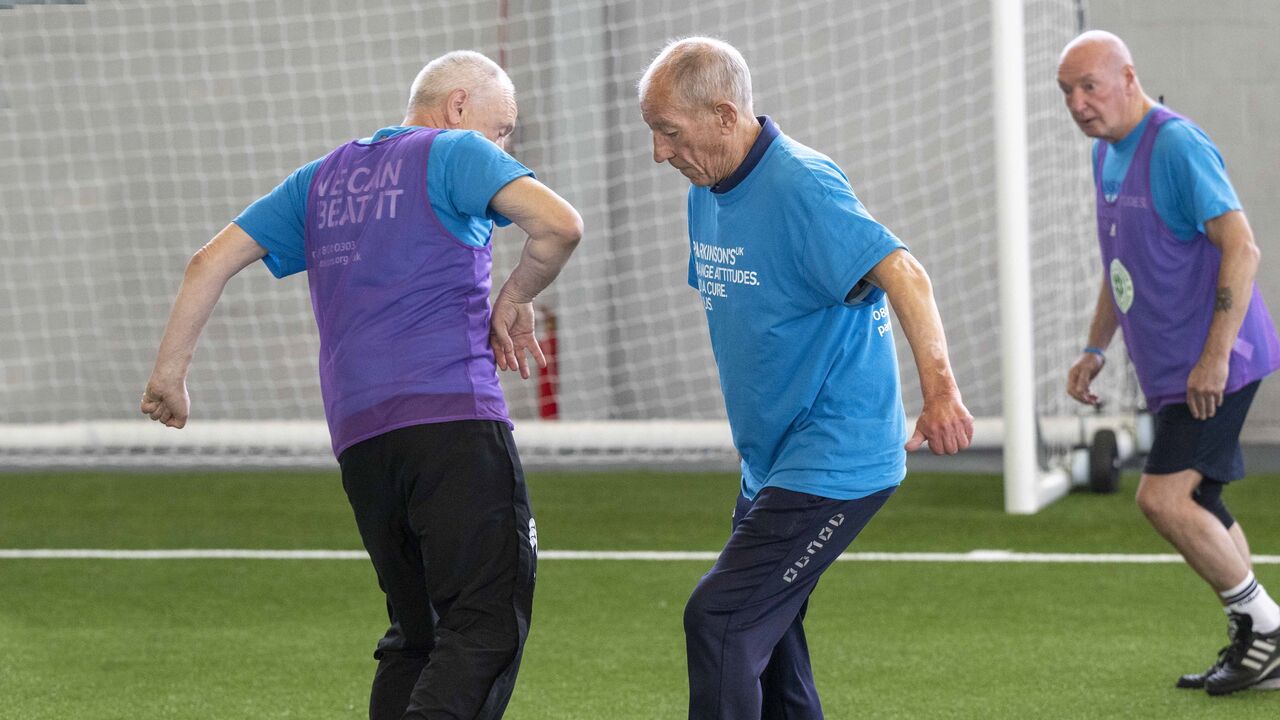As England head into the knock-out stages of the Euros, walking football fever is growing apace across the country.
In Coventry, a charity team is staging a walking football game and weekly sessions to help more people living with Parkinson’s to get active. On Thursday 4th July, a free showcase match between the local Parkinson's Walking Football team versus SBitC (Sky Blues in the Community) Cancer Support team is taking place. Among the players are several Walking Football Association (WFA) England internationals.
Spectators are welcome, especially anyone affected by Parkinson’s, and they can join the warm-up and enjoy a post-match cuppa. The warm-up is at 2.30pm and with the match kick off at 3pm.
Thursday 11th July sees the start of free, weekly Parkinson’s walking football sessions, for anyone with Parkinson’s or other neurological conditions. WFA rules will apply, but there is no commitment required and all sessions are supervised by a qualified coach.
Anyone interested in attending regularly can email coordinator Michael Tombs at This email address is being protected from spambots. You need JavaScript enabled to view it. for further updates. The venue for all sessions, including the showcase match, will be Coventry Sphinx Sports & Social Club, Sphinx Drive, off Siddeley Avenue, Coventry CV3 1WA.
Michael Tombs was diagnosed with Parkinson’s in 2021 and is behind both the match and the new sessions. He is coordinator of the Parkinson's UK Coventry Support Group and says: "When I was first diagnosed, I was put on medication and looked for ways to achieve my recommended weekly dose of 2.5 hours of intensive physical activity.
“I had heard about walking football and quickly discovered Sky Blues in the Community (SBitC). It had been about 40 years since I had last played football regularly, but I was welcomed into their Cancer Support Walking Football group by the coaching staff, volunteers and players.
“I was amazed by how they all coped with their personal circumstances and supported each other on and off the pitch. It inspired me to start a group for people with Parkinson’s.
“Thanks to a generous legacy donation, we now have the chance to support the local Parkinson’s community by running our own Coventry Parkinson's walking football sessions. We hope people can join us each week and watch a great match on July 4th."
Physical Activity Programme Lead for Parkinson’s UK, Tim Morton, said: “Being active is so important for people with Parkinson’s as it can help manage symptoms, maintain health and lift your mood.
“It can make you feel good inside and out. The more physically active you are, the easier it is to live well with Parkinson’s. Walking football is not just about being physically active, it can also have many social benefits.
“It is fantastic to see the sport going from strength-to-strength with more clubs and grassroots teams getting involved across the UK. Our grant funding helps more walking football projects to get off the ground and inspire people with Parkinson’s to get active in a fun and social way, and we’re so thankful for the legacy donation that made these new sessions possible.”
Stuart Langworthy, England Team Manager for Over 60s Walking Football at the Walking Football Association, said: “Since our Parkinson’s walking football project started in February 2023, we have seen a marked increase in the participation and engagement from the Parkinson’s community in England and we are delighted to see so many participants enjoying football together.
“Quite simply, this project has helped the WFA in its drive to increase support for grassroots walking football - and has undoubtedly enabled many more people living with Parkinson's to get up, get out and get active. Players have told us that playing walking football has changed, or even saved, their lives.”
Parkinson’s is what happens when the brain cells that make dopamine start to die. There are more than 40 symptoms, from tremor and pain to anxiety. Some are treatable, but the drugs can have serious side effects.
It gets worse over time and there’s no cure. Yet, Parkinson’s is the fastest growing neurological condition in the world.
Around 153,000 people in the UK have Parkinson’s, so Parkinson's UK is for everyone affected by the condition. Funding research into the most promising treatments, taking us closer to a cure every day.
Walking football is a popular team sport which started in 2011 and is based on the rules of Association Football. It’s played at a slower pace on smaller pitches and there is no tackling or contact allowed between players.
During passages of play the ball cannot go above chest or head height and there is no heading or use of the chest allowed when controlling the ball. Walking football is proven as a popular way for people living with long-term health conditions such as Parkinson’s to enjoy an active lifestyle and live well with the condition.
The sport focuses on problem areas for people living with Parkinson’s such as balance, muscle strength and coordination. Plus, it can also have benefits for cardiovascular health and mental wellbeing.
Walking Football is a unique small-sided ball game created by John Croot in 2011. The sport is played at a walking pace and no running is allowed, this includes with the ball or off the ball.
You can ‘walk’ as fast as you like, but one foot must always be in contact with the ground at all times. One major difference to association or 5-a-side football is that it’s a non-contact sport and although tackling is allowed, this must be done with no contact.
Parkinson’s UK began funding the Walking Football Association through their Physical Activity Innovation Fund in 2023. Since then, more than 100 new Parkinson’s walking footballers have taken up the sport since the investment from Parkinson’s UK and the WFA first started.
Premier League teams such as Arsenal FC and Nottingham Forest FC are among the household names that have started walking football projects to help more people living with long-term health conditions, such as Parkinson’s, to get into football. Walking football events, tournaments and challenges also continue to grow in popularity with the Parkinson’s community at a national and international level.











